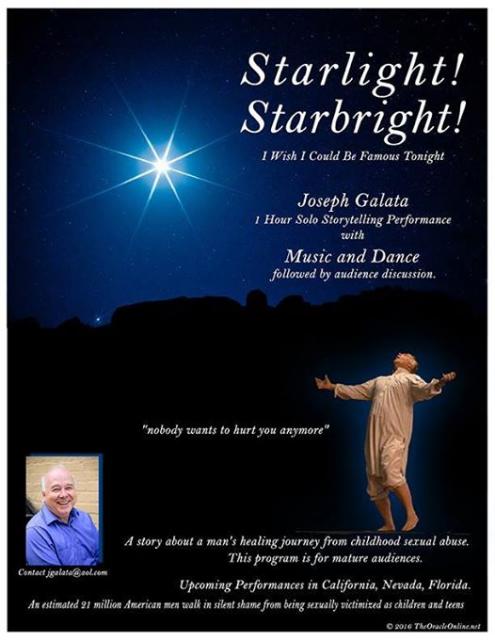
Though Joseph Galata presents his story, enhanced by dancing, as an autobiography, it’s difficult to tell what’s fact and what’s fiction. The central story of Starlight! Starbright! is about “his” experiences as a Bacha-Bazi. Literally, that means “boy play” but today and through Bacha-Bazi history, it describes a “Dancing Boy” of certain Middle Eastern areas. Galata embodies such a boy in dramatizing what appears to be his own history. Since it seemed Galata had just flown into Sarasota, he brought onstage a suitcase that he emptied of clothes and a few props. He performed this and every action afterward very quickly and with force. To a musical background (probably arranged just beforehand), he did warm-up exercises. An abrupt stop had him inviting us, his audience, to “my favorite reality TV show” with a story that’s “truth or a whopper.” Following stories about entanglement with an old woman who loved the “Chainsaw Massacre” films, and about his being abused and deciding to get all men who abused him “into a swamp,” he asked us what we’d do for a million dollars. What if we became famous for certain things? He advised to “sleep under stars” — presumably unlike what he did when he was solicited to be a Bacha-Bazi. He then told what that meant for a 12 year old. Bacha-Bazi boys are recruited, mainly from very poor families who are paid to give them up, to become dancers. Dressed as women, they may be as young as 10. They entertain men with money, prestige, position, and power — from merchants to military to policemen. They are usually raped, made sex slaves, or traded in serial sex deals. When they get into their late teens, they’re cast off. Thrown out at 15 because he got pimples, Galata says, he danced in streets, stole, serviced people, went to jail. When he returned “home” to see his mother, his father and all others humiliated and ostracized him as a fag. Galata got an old Irishman’s help to go to the U.S., bringing with him the lesson that lying and manipulation brought money. Always afraid he would be outed, Galata detailed years of dancing and “serving” with a partner in Hollywood, marrying a woman who believed his lies but finally had enough, finishing college, teaching, going through a string of religions. He kept his desire for revenge. He came to think telling his whole story and going back to where he’d come from would banish the ghosts of his past. He went through his parents’ deaths. Punctuating by vigorous dancing (more like stomping), Galata concluded that the best revenge would be “not to destroy myself.” He finally conveyed his hopes that his story might help deal with men throughout the world being sexually abused. “What if all came together?” I caught Galata before he needed to rush out to a plane. I asked him the spelling of Bacha-Bazi, as I hadn’t heard the word endings perfectly. Galata responded and suggested Google-ing “Afghanistan’s Dancing Boys” — which I did. There are not only histories and descriptions of what Galata spoke of, but also videos of current practices.
